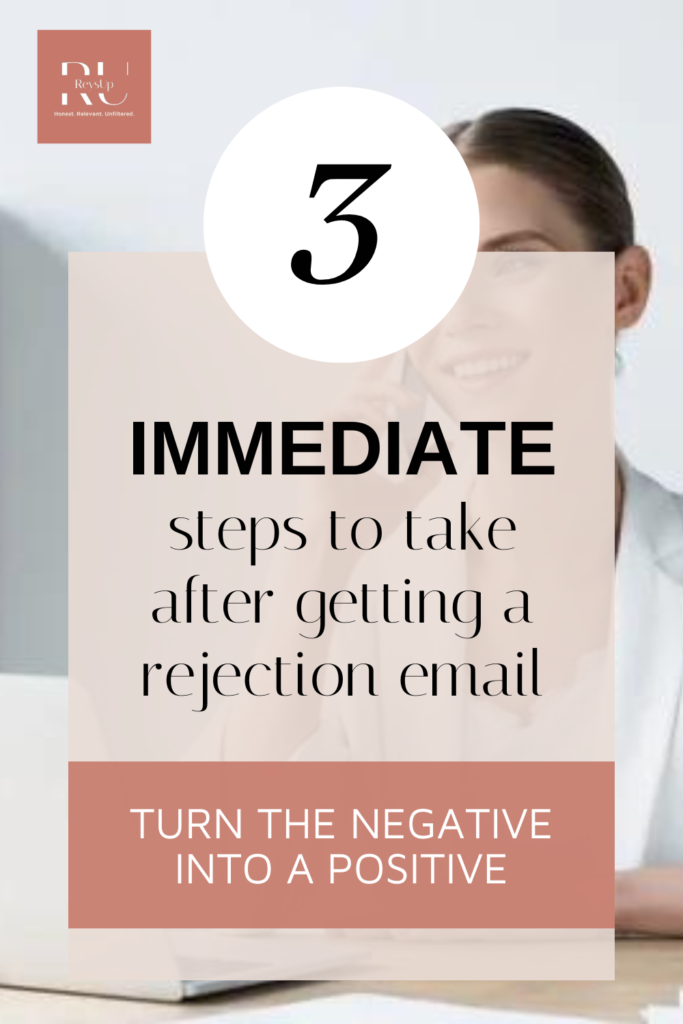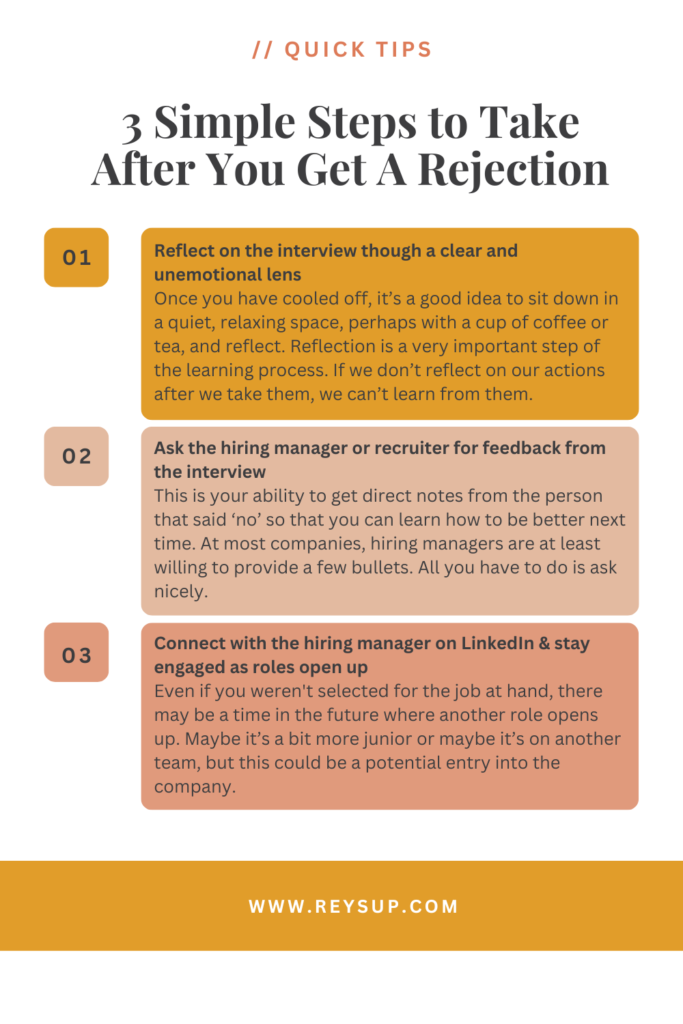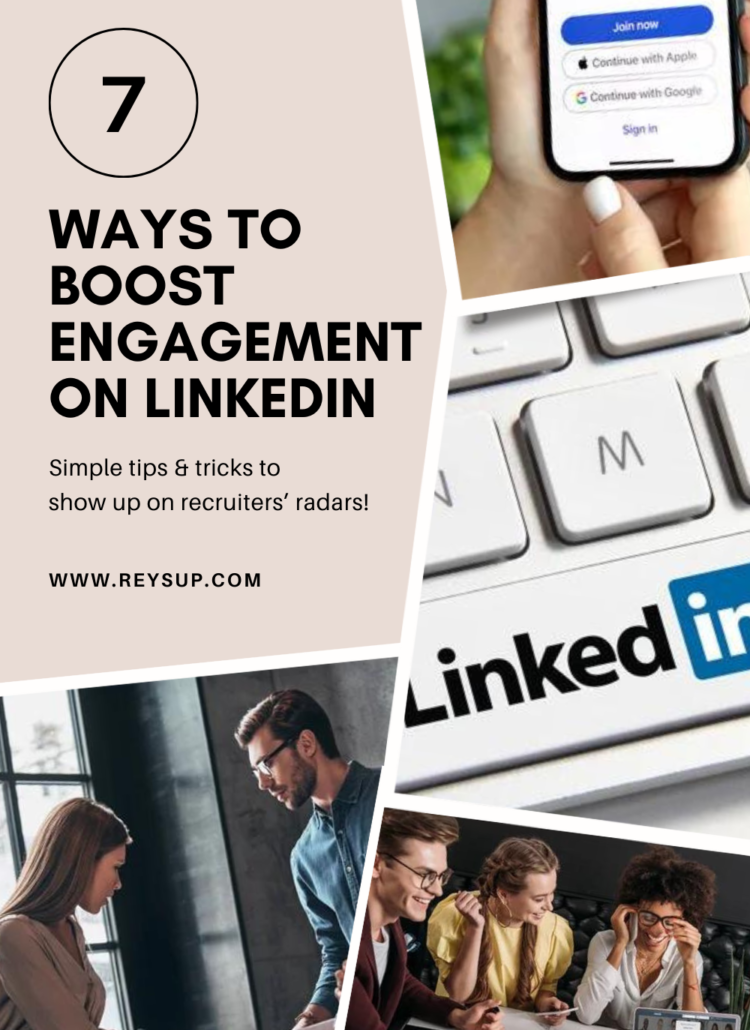This article is all about steps to take after you get a rejection email so that you increase your chances of landing a job next time.

We’ve all been there. Getting that dreaded ‘After careful consideration we regret to inform you that…’ email. It really sucks and it totally hurts your ego. Especially if it was your dream company or your perfect role. I’ve been in the field for a little over a decade, and I can tell you that everyone deals with rejection. Especially in today’s job market where there are literally tens of thousands of qualified people looking for jobs in tech. Some of the most successful people I know currently working at top tech companies have shared stories about getting rejected before even getting to the hiring manager screen. Unless you are very lucky, it’s pretty unrealistic to get a job in tech without experiencing it at least once.
This article shares 3 steps to take after you get a rejection email. If you harness the rejection and learn from it, you’ll be better prepared for future interviews and improve your chances of landing your dream job.
3 Simple Steps to Take After You Get a Rejection Email

1. Reflect on the interview though a clear and unemotional lens
- Once you have cooled off, it’s a good idea to sit down in a quiet, relaxing space, perhaps with a cup of coffee or tea, and reflect. Reflection is a very important step of the learning process. If we don’t reflect on our actions after we take them, we can’t learn from them.
- Think back through the interview with a critical eye.
- What went well? Were there questions where you thrived? If yes, consider leading with those points in your elevator pitch when you kick off the interview because clearly you are comfortable with that content.
- What didn’t go well? Where did you struggle the most? Did you struggle there because you didn’t have the relevant experience or couldn’t articulate a point well.
- What were you surprised to hear? If there were questions that caught you off guard, add them to your prep.
- How were your nerves? If high and you drank a cup of coffee beforehand, maybe consider changing that part of your routine next time.
2. Ask the hiring manager or recruiter for feedback from the interview
- Many candidates forget to do this. One of the simplest ways to learn from an interview is by asking the hiring manager or even the recruiter for feedback. This is your ability to get direct notes from the person that said ‘no’ so that you can learn how to be better next time. At most companies, hiring managers are at least willing to provide a few bullets. All you have to do is ask nicely.
- If the hiring manager provides feedback that you lacked ‘experience’ in a certain area, that tells me that you didn’t do a good enough job proving your case with real life examples. By getting this feedback, you now know that you have to come up with more concrete examples that show you are qualified and experienced in that area.
- If the hiring manager provides feedback that you didn’t answer a specific question well or stumbled too much on a topic, that tells me that you just need more practice with your responses. By getting this feedback, you now know that you need to rehearse specific replies that you thought you had down but don’t. By the way, the best way to do this is to write the answer out in its entirety and speak it out loud. Don’t do it just in your head.
Also Read Simple and Easy Explanations to Complex Company Benefits
3. Connect with the hiring manager on LinkedIn and stay engaged as roles open up
- This is an important step. If you get rejected after an interview, one of the best things you can do is stay in touch with the hiring team. The best way to do this is LinkedIn, because the recruiter can easily remember who you are by viewing your photo and profile page details.
- This is important because even if you weren’t selected for the job at hand, there may be a time in the future where another role opens up. Maybe it’s a bit more junior or maybe it’s on another team, but this could be a potential entry into the company. I personally have reached out to candidates that I have rejected for roles to see if they would be a fit for another one on the team.
- The secret that many people don’t know is that hiring top talent is actually really hard. If you showed up and did a good job in the interview but you just weren’t a fit for the specific role, it’s likely that the hiring manager would consider you again for another role. Your job is just to make sure you stay top of mind. Periodically review the job board of the company and shoot the recruiter a message on LinkedIn. They will remember you and admire your determination to join the team.
Other Things to Consider After You Get a Rejection Email
Make Sure You Have the Industry-Specific Skills
If you get a rejection letter, it’s a good idea to go back and re-read the industry-specific skills that the company was looking for. If there are tangible skills that you currently lack, consider taking online classes to sharpen those skills and stand out in the applicant pool. Platforms like Coursera, Udemy, and LinkedIn Learning offer a wide range of courses that can help you gain the necessary competencies. By proactively improving your skill set, you not only enhance your qualifications but also demonstrate your commitment to professional development to future employers.
Seek Advice from Your Industry Contacts
Networking plays a crucial role in career advancement. After a rejection, consider reaching out to people you know within the industry or even within the company that rejected you. They can provide valuable insights into what the company is looking for and how you can better prepare for future interviews. Additionally, seeking advice from contacts at similar companies can help you understand industry standards and expectations. If you have connections who are willing to give you a referral, it can significantly boost your chances of getting noticed by other employers.
Revise Your Resume
Your resume is often the first impression a company has of you. After a rejection, take the time to review your resume and make sure it is tailored to the specific role and industry you are targeting. Add in more keywords that align with the job descriptions you are reading online and highlight experiences that directly relate to the positions.
Reflect on Your Career Aspirations
Although it may be hard to hear sometimes, a rejection can be a good moment for self-reflection. It’s important to consider whether this industry or type of company is truly the right fit for you. Sometimes, we apply for positions out of convenience or because they seem like the logical next step, without critically evaluating if they align with our long-term career goals and personal interests. Use this time to think about what you genuinely want in a career. If the rejection helps you realize that you were not passionate about the role or industry, that’s a great learning!
Stay Positive and Continue Applying
It’s important to maintain a positive attitude and not let a single rejection deter you from your career goals. Persistence and resilience is the name of the game. Make sure to keep applying to other positions while you work on improving your skills and resume. The job market can be competitive, and the more opportunities you pursue, the higher your chances of success.
If you enjoyed this article, be sure to check out our similar article on how to standout on LinkedIn so recruiters can find you.
*This article is all about steps to take after you get a rejection email*




